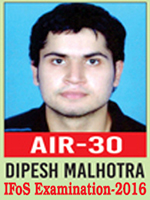 Hello Everyone I am Dipesh Malhotra. I have done my B.Tech in Civil Engineering from IIT Roorkee. I have given Civil Services Exam and Forest Service Exam, 2016. I have got AIR 30 in Indian Forest Service Exam and waiting for my final result of CSE, 2016. I have taken coaching through classroom programme of IMS under the guidance of K. Venkanna Sir.
Hello Everyone I am Dipesh Malhotra. I have done my B.Tech in Civil Engineering from IIT Roorkee. I have given Civil Services Exam and Forest Service Exam, 2016. I have got AIR 30 in Indian Forest Service Exam and waiting for my final result of CSE, 2016. I have taken coaching through classroom programme of IMS under the guidance of K. Venkanna Sir.
Why Mathematics? Mathematics optional has few myths attached to it:
-
It suits people from IITs only.
-
It has a very vast syllabus.
-
There is a huge scaling against it.
-
It affects your G.S. preparation.
So, let me first breakdown these myths to help you make a informed decision regarding optional Results of last years show that many people from non-IIT institutes are able to get very good marks in Maths. Most prominent among them is Rank-08 Nitish K. Maths optional requires temperance, hardwork and concentration in terms of preparation and not extra-ordinary intelligence. That’s why cleaning IIT-JEE and CSE is a very different game altogether. So, its more of a psychological thing rather than a meaningful idea.
Comparing the level of syllabus with social sciences/ humanities syllabus gives a partial picture of the relative length. Every chapter may seem very lengthy in maths but that is the only limited part that one has to study for maths. On the other hand for humanities optional you have to study many other things not mentioned in syllabus creating two types of problem (a) Uncertainty and (b) Increased burden. So, in my opinion maths is one of the safe optional given the kind of result and uncertainty that surrounds other optionals.
Scaling is a scientific statistical tool used by UPSC to bring different optional on a same level playing field. However, when raw checking of answer sheets of different optional are done marks are awarded in an objective manner.
Therefore, marks in science optional especially mathematics would come out to be very high as around 90% of marks are awarded for right answer. Humanities answers always have subjectivity attached to them. Therefore, they get around 50-60% marks for correct attempt. Scaling causes 15-20% lowering of low marks that still makes maths to retain enviable position in marks tally.
There is a very big misconception in preparation circles that optional helps you in G.S. (General Studies) preparation. G.S. answers require a very different approach in terms of diversity and multi-dimensionality. Optional knowledge can be used as a foot-note and not as a main theme of a G.S. answer. Given, the changing nature of prelims and mains G.S. papers, knowledge of humanities optional is not going to help in future. So, in my opinion maths can give you better opportunity in terms of marks and certainty to clean the exam.
What should be the strategy of preparation?
Mathematics require large amount of practice, clarity and revision. Given the limited nature of sources and syllabus this seems to be a easy task. But it is easier said than done. So, in order to bring clarity one needs to be very through with the concepts and fundamentals. For this I would recommend IMS classroom programme and notes prepared by venkanna Sir. It will make your preparation easy and focused as different topics are available at one place and in a more exam focused manner. Venkanna Sir in a very student friendly manner that makes you very comfortable in that environment and helps to clear doubts. After that you can go for certain basic books for practice and some specific set of problems. But those things are also guided well by Sir himself.
For practice purpose various tutorial sheets provided by institute are very helpful. At the same time it should be kept in mind all the concepts and problems from IMS should be practiced first hand and then go for books. Test series by IMS helps in revision and practice as all the books problems and previous year questions are prepared and covered well.
So, few basic points are very important:—
-
Continuous preparation from first.
-
Revision and practice of those notes.
-
Some specific and typical problems from books.
-
IMS Test series.
-
Formulae shout notes to be used before exam and tests.
For preparation chronology I would recommend going for easy and scoring topics first like ordinary differential equations, partial differential equations, linear algebra, vectors, numerical analysis, complex analysis, LPP etc. Some topics like statics and dynamics as well as mechanics have to be prepared thoroughly given the changing nature of exam. For them go for all previous year questions and basic concepts.
Do not try to go into very deep physics as ultimate aim is to score well and not to become a physicist. At the end of preparation and near the exam, one faces problem of revision – So, I would recommend following points:
-
Summary of chapters
-
Formulae sheets.
-
Test Series.
Reason I am stressing on test series are following:
-
It helps to get into touch with all type of problems
-
Give an idea relating to format of presentation in exam.
-
Real-time and real-exam simulation to get an experience to handle stress.
-
Habit of writing well will not develop overnight. So, constant grilling before exam is required.
Dipesh Malhotra
AIR-30 in CSE/IFoS-2016

